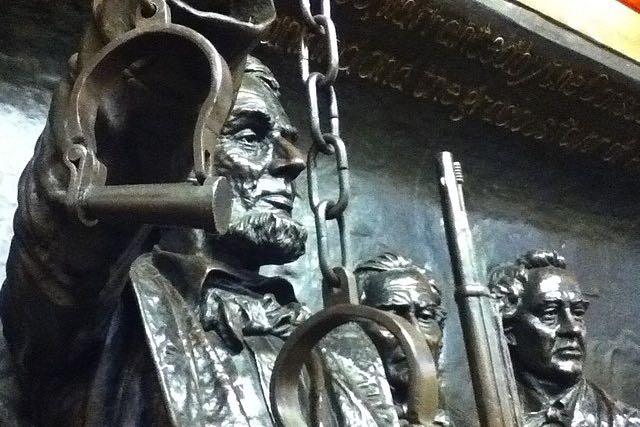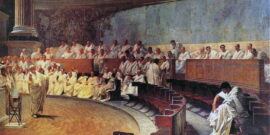One of the thinkers Steve Bannon says he admires, Julius Evola, despised the United States and everything it stood for.
Meeting Mr. Lincoln
Frederick Douglass dedicated his rich public career to untangling the moral complexities of American life. In his 1865 eulogy to the recently assassinated Abraham Lincoln, Douglass alleged that the departed president had been “unsurpassed in his devotion, to the welfare of the white race.” After all, Lincoln was slow to embrace emancipation, which he justified as a pragmatic measure, necessary to combat the Confederate rebellion. But Douglass also found in the slain president someone who had transcended the callous racial dogmas of his era. Lincoln was “in a sense hitherto without example, emphatically the black man’s President: the first to show any respect for their rights as men.”
Douglass was alluding to the subjects of Jonathan W. White’s superb new book, A House Built by Slaves: those African Americans who met with Lincoln, shook his hand, and confided in him their exalted aspirations and earnest appeals. Even prior to emancipation, many arrived uninvited to the White House and insisted on equal access to the president. During soirees, public receptions, or even private encounters, they claimed the “right to be constituents with a voice that could be heard by the highest political officer in the nation.”
And Lincoln reciprocated. For the first time in the nation’s history, a president treated people of color with dignity, respecting their liberty to petition the government. They came from across the country. Some had been born enslaved. Others had carved out lives of liminal autonomy in a white republic. And during the Civil War, whether as soldiers in the Union army, laundresses in refugee camps, religious leaders, or public intellectuals, they shaped the politics of emancipation to claim a rightful stake in American democracy. Such interactions forged an unprecedented bond between black people and a white president.
The presidency was no longer an imposing obstacle to black liberation, the White House no longer a sealed edifice inhabited by powerful slaveholders.
African Americans saw in Lincoln, White suggests, an image of themselves: a man born poor, burdened by the obstacles of his unprivileged youth. Lincoln saw in African Americans a people who, like himself, asked for little more than the freedom to compete in the race of life, to pursue personal independence liberated from arbitrary, unjust oppression. In their private meetings, surrounded by the majestic trappings of the executive mansion, they discussed the prospect of an equitable, biracial republic, together fueling a “new birth of freedom.”
Lincoln rarely interacted with African Americans in his life prior to the presidency. Though he defended some as an attorney and considered his barber, William de Fleurville, among his closest confidants, “he was,” White explains, “a man of his times.” Lincoln recognized the distinct racial spheres that demarcated American life. He nevertheless condemned slavery as a moral evil, an abuse of human nature, a violation of the self-evident truths outlined in the Declaration of Independence. “If the negro is a man, why then my ancient faith teaches me that ‘all men are created equal,’” Lincoln proclaimed in 1854. Yet he also echoed the prevailing sentiments of his day, acknowledging the incapacity of white Americans to tolerate racial equality.
White narrates a familiar story of the Civil War transforming Lincoln’s thinking on race and emancipation. But the nature of Lincoln’s wartime evolution unveils White’s vital contribution. Lincoln’s myriad meetings with African Americans compelled him to recognize a new reality born by the fiery trial of war. The presidency was no longer an imposing obstacle to black liberation, the White House no longer a sealed edifice inhabited by powerful slaveholders.
Perceiving Lincoln as an ally in the cause of freedom, black lobbyists transformed the functioning assumptions of the American presidency. They viewed the White House as an equitable space from which to petition the government. Recognizing their innate humanity, Lincoln listened to his visitors’ concerns. “I am proud to say that I never was treated with more kindness and cordiality than I was by that great and good man,” the renowned black abolitionist Sojourner Truth reflected in 1864 on her meetings with Lincoln.
Above all, Lincoln’s black visitors believed that the republic could evolve, that it was not rooted in structural, unchanging oppression.
In White’s careful telling, emancipation was not a moment of white beneficence bestowed upon passive slaves. It was rather a personal and public negotiation between Lincoln and his black visitors to shape a new national order. Such were extraordinary deliberations in American statecraft. The earliest meetings featured African Americans urging Lincoln to expand a war waged for national restoration into a crusade for universal freedom.
African American leaders also mobilized against the president’s proposal to colonize free people of color abroad. To persuade conservative Border State Unionists to pursue gradual, compensated emancipation, Lincoln promoted colonization to cure the alleged racial unrest spawned by black freedom. During an August 1862 meeting with black clergymen, Lincoln even blamed the nation’s great bloodletting on African Americans: “But for your race among us there could not be war. . . . It is better for us both, therefore, to be separated.” Black petitioners practiced an intimate politics when, in the people’s house, they contested the president’s infamous colonization scheme. They conveyed to Lincoln that they were not trespassers deemed fit for lives in foreign lands. Rather, they were in and of the republic, a people whose toil had plowed the land, whose sweat had nourished the soil, whose labor had built the continent. They did not merely identify as American. They were Americans, who embraced democracy and the Union’s claim to genuine liberty and equality.
Above all, Lincoln’s black visitors believed that the republic could evolve, that it was not rooted in structural, unchanging oppression. White recounts the compelling story of E. Arnold Bertonneau and Jean Baptiste Roudanez, two New Orleans Creoles who visited Lincoln in early 1864. They insisted that civil equality, citizenship, and suffrage needed to accompany emancipation. The men framed their requests within language familiar to Lincoln. People of color, they announced, pledged “their fortunes and their lives” for “the Country and the Constitution,” prepared to defend “those inalienable rights which belong to the condition of citizens of the great American Republic.”
Bertonneau and Roudanez reminded Lincoln that the Confederate war was not simply a rebellion against federal authority. It was a campaign against the philosophical propositions of American nationhood. Thus, the Union could never be preserved with freedom left undefined. Bertonneau and Roudanez echoed many black petitioners who beseeched Lincoln to understand the pragmatic and moral virtue of a natural constituency who could implant the Republican Party in the South and shield foundational national ideals against future domestic enemies.
Lincoln’s executive powers limited his ability to confer civil rights, a prerogative left to the states or Congress. But shortly after his meeting with Bertonneau and Roudanez, Lincoln lobbied Michael Hahn, the Reconstruction governor of Louisiana, to contemplate black citizenship and suffrage for “the very intelligent, and especially those who have fought gallantly in our ranks.” Among the most loyal of Americans, such citizens “would probably help, in some trying time to come, to keep the jewel of liberty within the family of freedom.” White leaves little doubt that Lincoln’s private encounters with African Americans convinced him that, regardless of race, civil equality secured the republic, fulfilling the paramount purpose of the Union’s war against slaveholding secessionists.
During his public life, Lincoln long endorsed the ideals of universal freedom and egalitarian opportunity. But as the great historian David M. Potter once wrote, Lincoln “could not knowingly take a position which would weaken the harmony of” Union. Lincoln indeed worried that swift, radical changes, when levied on a society skeptical of racial equality, could collapse the very nation and constitutional order to which he pledged ultimate fealty. Yet amid a terrible civil war, Lincoln beckoned all Americans “to think anew, and act anew,” to “disenthrall our selves, and then we shall save our country.” The war spawned an enormous, transformative vacuum, and African Americans entered Lincoln’s life in ways that never would have occurred during peace.
The relation of black people to a war waged in the name of slavery, to decide the fate of the nation, revealed to Lincoln the revolutionary necessity of emancipation and biracial civil rights.
Jonathan White’s fine book relates the many stories of black Americans who unsettled rigid racial barriers to confront an American president in their pursuit of authentic justice. Their appeals for freedom, petitions for equality, and stalwart loyalty to the nation presented unparalleled moral demands on the American regime. Without their full measure of devotion, Lincoln might well have never acted. And the Union might well have perished from the earth.



